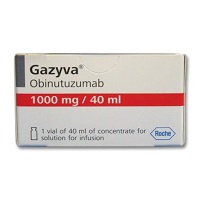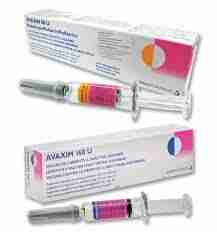



Gazyva Injection 1000 mg/40 ml
Share in Social Media
Chronic Lymphocytic Leukemia (CLL): Obinutuzumab in combination with chlorambucil is indicated for the treatment of patients with previously untreated chronic lymphocytic leukemia.
Follicular Lymphoma (FL): Obinutuzumab in combination with chemotherapy, followed by Obinutuzumab maintenance is indicated for the treatment of patients with previously untreated follicular lymphoma. Obinutuzumab in combination with bendamustine, followed by Obinutuzumab maintenance, is indicated for the treatment of patients with FL who did not respond to, or who progressed during or after treatment with rituximab or a rituximab-containing regimen.
Side Effects
The following adverse reactions are discussed in greater detail in other sections of the label:
Hepatitis B reactivation
Progressive multifocal leukoencephalopathy
Infusion reactions
Tumor lysis syndrome
Infections
Neutropenia
Thrombocytopenia
Pregnancy: Obinutuzumab is likely to cause fetal B-cell depletion based on findings from animal studies and the drug’s mechanism of action. There are no data with Obinutuzumab use in pregnant women to inform a drug-associated risk. Monoclonal antibodies are transferred across the placenta. In animal reproduction studies, weekly intravenous administration of obinutuzumab to pregnant cynomolgus monkeys from day 20 of pregnancy until parturition which includes the period of organogenesis at doses with exposures up to 2.4 times the exposure at the clinical dose of 1000 mg monthly produced opportunistic infections and immune complex mediated hypersensitivity reactions. No embryo-toxic or teratogenic effects were observed in the monkeys. Consider the potential risk to the fetus when prescribing Obinutuzumab to a pregnant woman.
The background risk of major birth defects and miscarriage for the indicated population is unknown; however, the estimated background risk in the U.S. general population of major birth defects is 2% to 4% and of miscarriage is 15% to 20% of clinically recognized pregnancies.
Lactation: There is no information regarding the presence of Obinutuzumab in human milk, the effects on the breastfed child, or the effects on milk production. However, low levels of obinutuzumab were present in the milk of lactating cynomolgus monkeys [see Pregnancy]. Human IgG is known to be present in human milk. Published data suggest that antibodies in breast milk do not enter the neonatal and child circulations in substantial amounts. The developmental and health benefits of breastfeeding should be considered along with the mother’s clinical need for Obinutuzumab and any potential adverse effects on the breastfed child from Obinutuzumab or from the underlying maternal condition.






